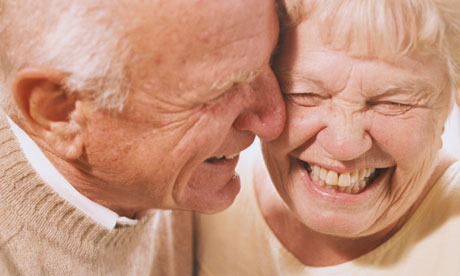
We might suffer sagging jowels and difficulty reading an A to Z, but getting older and giving way to the middle-aged spread are no barrier to happiness. Quite the opposite.
A cross-cultural study of 10,000 respondents across the UK and the US found that people reported better mental quality of life as they age, despite a decrease in physical quality of life. It seems to support earlier research which showed that happiness is being young or old, with a particular low-point coming in the mid-40s when depression is likely to hit.
The new research, undertaken by Warwick University, measured quality of life using eight different factors including perception of general health, pain, social functioning and mental health.
Dr Saverio Stranges, who led the study, said: "It's obvious that people's physical quality of life deteriorates as they age, but what is interesting is that their mental well-being doesn't also deteriorate – in fact it increases.
"We suggest that this could be due to better coping abilities, an interpretation supported by previous research showing older people tend to have internal mechanisms to deal better with hardship or negative circumstances than those who are younger.
"It could also be due to a lowering of expectations from life, with older people less likely to put pressure on themselves in the personal and professional spheres."
Previous research by Professor Andrew Oswald, also at the University of Warwick, has suggested that happiness levels follow a U-shape curve with their lowest point in the mid-40s after which they rise as people move into older age. For both men and women in the UK, the probability of depression peaked at around the age of 44.
Oswald said at the time: "What causes this apparently U-shaped curve, and its similar shape in different parts of the developed and even often developing world, is unknown.
"However, one possibility is that individuals learn to adapt to their strengths and weaknesses, and in mid-life quell their infeasible aspirations.
"Only in their 50s do most people emerge from the low period. But encouragingly, by the time you are 70, if you are still physically fit then on average you are as happy and mentally healthy as a 20-year-old. Perhaps realising that such feelings are completely normal in mid-life might even help individuals survive this phase better."
The new research studied being overweight aswell as ageing and found that with people with a BMI of more than 30 showing similar mental quality of life levels to those considered to be a healthy weight.
The study also looked at the effect of sleep on quality of life, and found there was an optimum window of sleep duration. Those who sleep between six and eight hours per day tended to have both better physical and mental health scores than those who slept on average less than six hours or more than eight hours.
What has been your happiest age so far? Post your comments below

